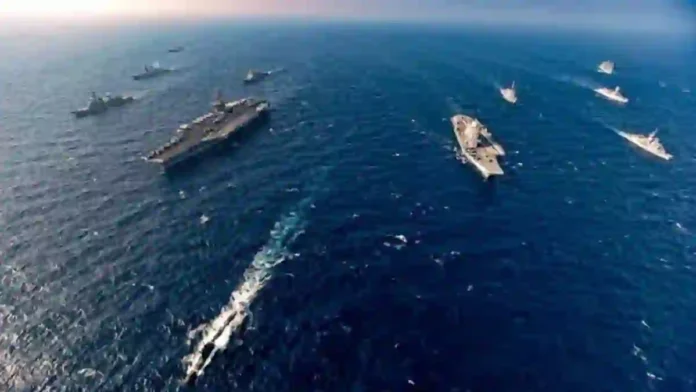India is charting an ambitious course to transform its Navy into a robust, networked blue-water force with a projected strength of over 200 warships and submarines by 2035. The strategic expansion comes amid intensifying maritime threats posed by China’s rapidly expanding naval footprint in the Indian Ocean Region (IOR) and Pakistan’s efforts to upgrade its submarine fleet with Chinese assistance.
Currently, the Indian Navy operates around 140 warships, including 17 diesel-electric submarines—11 of which are nearing the end of service life—alongside two indigenous SSBNs and over 250 aircraft and helicopters. With older vessels scheduled for retirement, the force aims to reach 200–230 warships and 350 aircraft by the mid-2030s.
Read- Russia, India & China Have Shared Interests, Says Lavrov
At present, 55 warships are under construction across Indian shipyards at an estimated cost of ₹99,500 crore, while another 74 vessels have received Acceptance of Necessity (AoN) for indigenous construction worth ₹2.35 lakh crore.
These upcoming projects include nine advanced diesel-electric submarines, seven next-generation stealth frigates, eight anti-submarine warfare corvettes, and 12 mine countermeasure vessels.
In addition, the Navy is pursuing the indigenous construction of a second aircraft carrier to succeed INS Vikramaditya, complementing the indigenously-built INS Vikrant, and plans four new 10,000-tonne destroyers to enhance surface combatant strength.
The submarine arm remains India’s most critical vulnerability. While China plans to bolster Pakistan’s fleet with eight Yuan/Hangor-class AIP-equipped submarines, India is negotiating a ₹70,000-crore deal with Germany’s TKMS and Mazagon Dock Shipbuilders for six new conventional submarines with AIP systems and land-attack cruise missile capability.
The stalling of the plan for three additional Scorpene submarines has only added urgency to revive India’s underwater strength, which currently rests on a mix of ageing Russian Kilo-class and German HDW boats along with six Scorpene-class units being inducted.
Senior naval leadership stresses that building a Navy of this scale is a generational process, requiring seamless planning and sustained investment. Apart from the P5 nations, India is the only country capable of designing, building, and operating both aircraft carriers and nuclear-powered SSBNs.
Read- DRDO And L&T To Test-Fire Indigenous ATGM From Zorawar Light Tank To Validate Its Weapon System
Read- Pakistan When Karma Comes Calling
Moreover, every investment in warship-building generates a multiplier effect, creating significant employment within shipyards and across ancillary sectors.
Defence planners project that if ongoing procurement, construction, and induction timelines are maintained, the Indian Navy could cross 200 frontline warships and submarines by 2035 and potentially rise to 230 by 2037, ensuring credible deterrence and maritime dominance across the IOR.
Indian Navy Capability Roadmap: Present To 2035
| Category | Current Strength (2025) | Under Construction / Approved | Planned Additions (by 2035) | Projected Strength 2035 |
|---|---|---|---|---|
| Total Warships & Submarines | ~140 | 55 under construction | 74 approved (AoN) + further pipeline projects | 200–230 warships & subs |
| Aircraft Carriers | 2 (INS Vikramaditya, INS Vikrant) | 1 Indigenous AC-II planned (under consideration) | Replacement of Vikramaditya | 2 fully operational + 1 building/induction |
| Destroyers | 10 (Delhi, Kolkata, Visakhapatnam classes) | 4 more Visakhapatnam under construction | 4 Next-Gen destroyers (10,000t each) | ~18 by mid-2030s |
| Frigates | 13 (Shivalik, Talwar, Godavari, etc.) | 7 under construction (Project 17A) | 7 Next-Gen Stealth Frigates | ~25 by 2035 |
| Corvettes | 23 (Kamorta-class ASW, Kora-class, etc.) | 8 Next-Gen ASW Corvettes sanctioned | New designs under AoN | ~30 by 2035 |
| Submarines (Diesel-Electric) | 15 (7 Kilo-class, 4 HDW, 4 Scorpene operational + 2 in induction) | 6 Scorpene (Project-75) already in induction; 3 additional planned (stalled) | 9 new AIP-equipped subs + 6 TKMS-MDL (P-75(I)) | ~24–27 conventional subs |
| Nuclear Submarines (SSBN/SSN) | 2 SSBNs (Arihant-class), 1 SSN in trials | More SSBNs planned (S4, S4*) | Indigenous SSNs planned (6) | 4–6 SSBNs, 3–4 SSNs by 2035 |
| Mine Countermeasure Vessels (MCMVs) | 0 (retired last vessel in 2019) | 12 sanctioned | Full induction by early 2030s | ~12 by 2035 |
| Naval Aircraft & Helicopters | ~250 (MiG-29K, P-8I, ALH, MH-60R incoming) | 24 MH-60R + UAV programs | Expansion with TEDBF, Naval HLFT | ~350 by 2035 |
Key Highlights
India currently sits at ~140 combat platforms but aims for 200+ by 2035, with projections rising to 230 by 2037.
Biggest gaps lie in conventional submarines and MCMVs, both being addressed through ongoing contracts.
Indigenous programs—aircraft carrier, destroyers, SSNs—will be crucial to sustain pace against China’s 370-ship fleet.
Carrier aviation will be reinforced with TEDBF (Twin-Engine Deck-Based Fighter) and naval helicopter inductions.
Indigenous Momentum: Almost 90% of new orders are intended for Indian shipyards under Aatmanirbhar Bharat.
Based On TOI Report
Agencies




